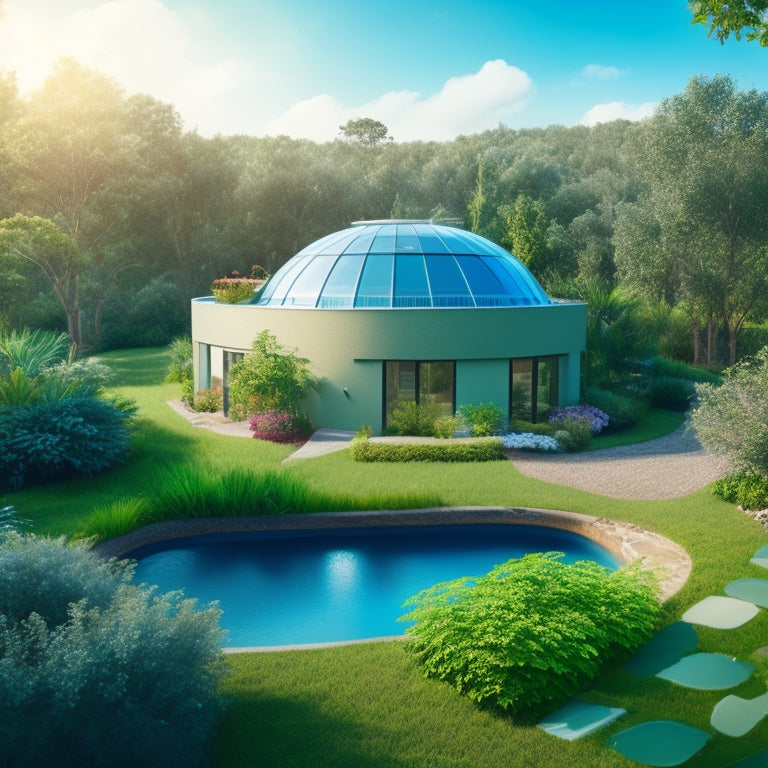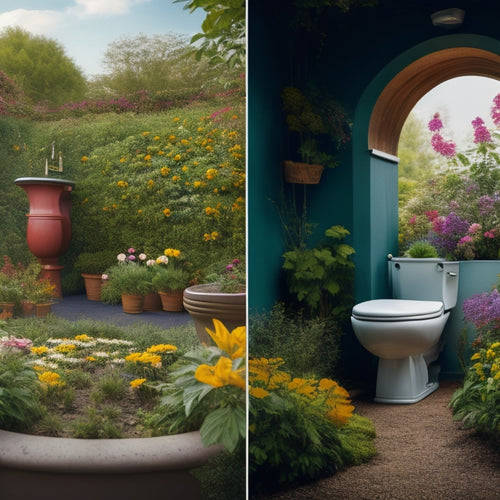
3 Ways Rainwater Harvesting Boosts Your Home's Value
Share
By incorporating a rainwater harvesting system into your home, you'll not only reduce your reliance on municipal water supplies but also enhance your property's value and appeal, thanks to the unique features and sustainable practices it brings. You'll improve your home's curb appeal, reduce water consumption costs, and promote environmental sustainability. Additionally, you'll differentiate your property from others on the market, making it more attractive to eco-conscious buyers. As you investigate the benefits of rainwater harvesting, you'll uncover even more ways it can raise your home's value and desirability.
Key Takeaways
- Rainwater harvesting systems enhance property appeal and value potential by integrating with outdoor aesthetics and adding unique features.
- By reducing water consumption costs, rainwater harvesting increases a home's value and appeal to environmentally conscious buyers.
- Well-designed rainwater harvesting systems add visual interest and sophistication, increasing a home's curb appeal and resale value.
- Rainwater harvesting promotes water conservation, reducing reliance on municipal water supplies and benefiting both the environment and finances.
- By contributing to a sustainable future, rainwater harvesting systems increase a home's value and appeal to eco-friendly homebuyers.
Increased Property Appeal
Many homeowners invest thousands of dollars in gardening and exterior design to improve their property's curb appeal, but few consider the potential of rainwater harvesting systems to enhance their home's attractiveness.
You can increase your property's appeal by incorporating a rainwater harvesting system into your outdoor aesthetics, much like how solar EV charging stations can increase property value potential.
By doing so, homeowners can also reduce their reliance on municipal water supplies, which can lead to significant cost savings over time.
A modern design approach can seamlessly integrate these systems into your outdoor space, creating a unique feature that sets your property apart.
Well-designed rainwater harvesting systems can become a focal point, adding visual interest and sophistication to your property.
Reduced Water Consumption Costs
By incorporating a rainwater harvesting system into your home, you can greatly reduce your water consumption costs, especially during periods of heavy watering or dry spells.
This is because you'll be using free rainwater instead of potable water for non-potable purposes like flushing toilets, washing cars, and irrigating your lawn. As a result, you'll see significant utility savings on your water bill.
Additionally, adopting sustainable practices like renewable energy solutions can further enhance your home's eco-friendly appeal.
Rainwater harvesting systems also promote water conservation, which is essential in areas where water scarcity is a concern.
By reducing your reliance on municipal water supplies, you'll be doing your part for the environment while also padding your wallet.
Enhanced Environmental Sustainability
Implementing a rainwater harvesting system in your home notably enhances its environmental sustainability. By collecting and storing rainwater, you're reducing your reliance on municipal water supplies, which in turn decreases the amount of energy needed to treat and transport water. This eco-friendly solution promotes water conservation, an essential step in preserving our planet's precious resources.
In addition, rainwater harvesting reduces stormwater runoff, mitigating the impact of pollutants and sediments on local waterways. Moreover, using renewable energy sources, such as solar power, to pump and treat rainwater can greatly reduce greenhouse gas emissions.
As a homeowner, you're taking a proactive step towards minimizing your carbon footprint, making your home more appealing to environmentally conscious buyers. By investing in rainwater harvesting, you're not only enhancing your home's value but also contributing to a more sustainable future.
Frequently Asked Questions
Can I Use Harvested Rainwater for Drinking and Cooking Purposes?
You can use harvested rainwater for drinking and cooking, but only if you guarantee it meets potable water quality standards through proper filtration methods, like UV treatment, sedimentation, and disinfection, to remove contaminants and pathogens.
Do Rainwater Harvesting Systems Require Frequent Maintenance?
You'll be relieved to know that rainwater harvesting systems don't require frequent maintenance, but you'll still need to perform regular checks to guarantee system efficiency; create a maintenance checklist to stay on top of tasks like gutter cleaning and tank inspections.
Can I Install a Rainwater Harvesting System Myself?
You're probably wondering if you can install a rainwater harvesting system yourself, but can you really handle the complexity? While it's possible, you'll need to carefully select system components and follow essential installation tips to avoid costly mistakes.
Are There Any Local Regulations Governing Rainwater Harvesting Systems?
You'll need to research local guidelines governing rainwater harvesting systems in your area, ensuring compliance with water quality standards and regulations, as some regions have specific rules and permits required for installation and maintenance.
How Long Does It Take to See a Return on Investment in Rainwater Harvesting?
You'll typically start seeing a return on investment in rainwater harvesting within 5-10 years, as cost savings from reduced water bills and environmental benefits from decreased stormwater runoff accumulate, ultimately offsetting the initial system installation costs.
Related Posts
-

Why Transform Human Waste Into Garden Gold?
By changing human waste into garden gold, you'll reduce waste management costs, support sustainable agriculture, and ...
-

10 Eco-Friendly Air Management Tools for Clean Home Living
You're taking an essential step towards creating a healthier living space by seeking eco-friendly air management tool...
-

3 Eco-Friendly Automated Blinds for Contemporary Living
You're looking to raise your living space with automated blinds that not only exude contemporary style but also align...


